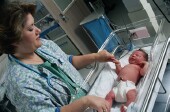- Could Your Grocery Store Meat Be Causing Recurring UTIs?
- Are You Making This Expensive Thermostat Error This Winter?
- Recognizing the Signs of Hypothyroidism
- 10 Strategies to Overcome Insomnia
- Could Artificial Sweeteners Be Aging the Brain Faster?
- Techniques for Soothing Your Nervous System
- Does the Water in Your House Smell Funny? Here’s Why
- Can a Daily Dose of Apple Cider Vinegar Actually Aid Weight Loss?
- 6 Health Beverages That Can Actually Spike Your Blood Sugar
- Treatment Options for Social Anxiety Disorder
Blood Test Might Help Prevent Certain Birth Defects


A simple blood test could help prevent neural tube birth defects such as spina bifida, new research finds.
The test would measure the concentration of folate (a form of vitamin B) in a pregnant women’s red blood cells. The findings from this study — conducted by an international team of scientists — could help doctors predict the risk of serious birth defects known as neural tube defects because folate is vital to the proper development of a growing fetus.
In addition to naturally occurring folate found in food, a synthetic form of folate known as folic acid is also available in fortified foods and supplements. Although taking folic acid supplements during pregnancy is known to reduce the risk of neural tube defects, it’s unclear how much of this nutrient is needed to prevent them. The current recommendation is that pregnant women consume 400 micrograms of folic acid per day.
Previous research suggested that the risk for neural tube defects increases as folate concentrations in a pregnant woman’s red bloods drop. To determine if there is an ideal red blood cell folate concentration that could help predict neural tube defect risk, the study’s authors analyzed data from two population-based studies from China. The studies involved more than 220,000 births. Of these babies, 250 were born with neural tube defects.
The researchers estimated the link between red blood cell folate concentration on the 28th day of pregnancy and the risk for neural tube defects. They found lower red blood cell folate concentrations were associated with the highest risk for a neural tube defect, or 25.4 per 10,000 births.
This risk was reduced however, when folate concentrations were higher, the study published on July 29 in The BMJ online revealed.
The study authors concluded their findings could help scientists develop and monitor neural tube defect prevention programs for women around the world.
In response to the findings, researchers from the Nuffield Department of Population Health at the University of Oxford commented in a journal news release that monitoring women’s red cell concentrations may help shape global policy decisions “and allow public health leaders to monitor a population’s response with the ultimate goal of reducing the incidence of largely preventable neural tube defects.”
The next step, the study’s authors pointed out, is to determine how much naturally occurring folate from food or folic acid in supplement form is needed to achieve this ideal range of red blood cell folate concentrations.
More information
The U.S. National Institutes of Health provides more information on neural tube defects.
Source: HealthDay
Copyright © 2026 HealthDay. All rights reserved.










